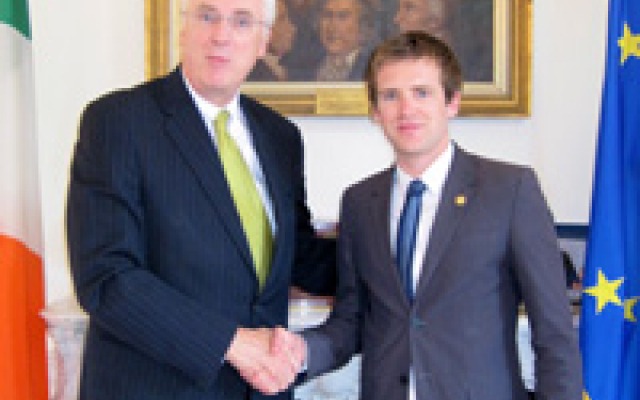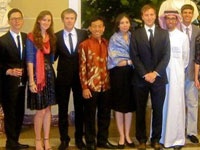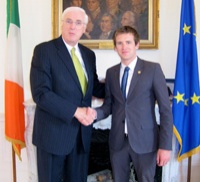alumni
BSE student leverages knowledge of development economics at Youth G20 Summit in Washington

Master in International Trade, Finance and Development student Cormac Mangan '12 was chosen to act as World Bank President at this year's Youth G20 Summit in Washington, D.C. (United States). In the following brief, he discusses how he leveraged knowledge of development economics from the master program during the selection process for the summit and in the working sessions.
The Youth G20 summit brings together nearly 200 student delegates representing each of the G20 countries and 5 international institutions in order to develop solutions to global problems and provide a youth perspective on key international issues. Delegates assume roles such as president or minister of finance while representing their countries and employ the informal, consensus-based methods of negotiation adopted by the real G20 in covering a range of issues from the war in Syria to the role of land rights in development. The negotiations result in a final communiqué that is presented to government and civil society leaders.

Development Committee, Youth G20 Summitt 2012 (with Mr. Mangan, third from left).
Leveraging know-how gained in the master courses
I was chosen to act as World Bank president, presiding over the development committee of ministers, after selection process run by the American representative organizing committee to the G8 & G20 Youth Network. In my application and interview I emphasised the combination of technical understanding and policy focus on development issues that I had acquired as part of the BSE Master in International Trade, Finance and Development.
Of particular relevance to my role at the summit was the course Advanced Economic Growth and Development with Prof. Xavier Sala-i-Martin (Columbia University and BSE guest professor). In this course, we discussed recent debates in development and critically assessed the role of the World Bank. Having a comprehensive academic grounding in development issues I was able to confidently negotiate the development agenda during the summit. It was a distinct advantage being able to analyze policy issues such as aid effectiveness from a more analytical economic perspective.
In discussing conflict interventions during the negotiations I also drew from the course Conflict: Development and Institutions with Prof. Hannes Mueller (IAE and BSE), in which we studied the causes and economic effects of violence. A core issue on the development committee this year was food security and how to prevent and mitigate future food crises. Having carried out my group policy project investigating financial innovations that improve agricultural productivity in Africa, I was able to propose pragmatic solutions and direct the discussion on policies to enhance agricultural productivity and food security for the rural poor.

BSE masters student Cormac Mangan '12 with Irish Ambassador to the United States Michael Collins at the Youth G20 Summit in June.
Advice to GSE students: Capitalize on your knowledge of economics and your international experience
Given the nature of the forum, discussing development issues with students from all over the world, I was well prepared having done just that with my classmates all year. The BSE masters are made up of a very diverse group of international globetrotters that hold very different experiences and perspectives. Throughout the year we shared our experiences and talked about recent topics in development, and through these exchanges I learned a great deal both about the dynamics of development and how development is approached in different countries.
The Youth G20 will be held in Moscow next year, and I encourage past and future International Trade, Finance and Development students to capitalize on their knowledge of economics by taking part and making the youth’s voice heard on global issues.
– Report prepared by Cormac Mangan '12

